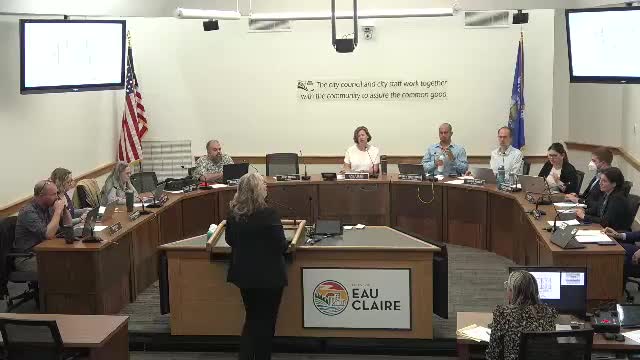Council holds first public discussion of 2026 operating budget, staff outline options and fees
Get AI-powered insights, summaries, and transcripts
Subscribe
Summary
City staff presented the first public discussion of the 2026 proposed operating budget on Oct. 13, outlining revenue constraints, personnel cost pressures and a proposed $26 local vehicle registration fee increase to help balance the general fund.
City staff presented the first public discussion Oct. 13 of the City of Eau Claire’s proposed 2026 operating budget, detailing revenue constraints, personnel costs and a mix of one-time and ongoing measures to balance the general fund.
Director Winters summarized the budget framework and constraints, saying the city’s total budget across all funds is about $198 million and the general fund is roughly $100.8 million. "Of that, 56% of that is just staff," Winters said, adding that contractual services account for about 9% and that capital-related financing uses make up a sizeable portion of the remainder. Winters said CPI and other cost increases produced roughly $3.2 million of pressure.
To bridge gaps staff proposed a combination of measures. The draft budget includes a proposed increase of $26 to the local vehicle registration fee (bringing the total fee charged to residents to $50, according to staff) to help balance the budget; staff said the council had previously discussed a larger increase and that refined adjustments brought the proposed increase down. Winters said the proposed budget uses some one-time funds to support the paid-parking rollout and to complete a study of the municipal trash collection zones.
Winters described other items in the proposed budget: free transit passes for Eau Claire Area School District students (staff estimated the cost at about $25,000), reassignment of existing staff time rather than creation of a new full-time sustainability coordinator (staff said half of a planner position would be refocused on sustainability and water-study work), and modest reductions in donations to three partner agencies. He said council-directed priorities were funded through offsets rather than new net increases in ongoing staff.
Multiple council members questioned tradeoffs and timing. Council Member Serrano asked how the proposed reduction from $31 to $26 on the vehicle registration contribution was achieved; Winters said the city moved some capital road repairs and shifted funding internally and used a "scalpel approach" across department budgets. City staff and Council Member Otto said more difficult choices may be required in 2027 if pressures continue.
Winters also previewed an item the city is exploring with other municipalities: advocacy for state authorization of a local option sales tax to capture revenue from the sizable daily commuter population that does not pay property taxes. He said about 30,364 people commute into the city daily based on 2022 data, increasing the daytime population toward 90,000, and staff argued a local option sales tax could help capture revenue from nonresidents who use city infrastructure.
The council scheduled further discussion in an Oct. 14 work session and a first reading of an ordinance to adjust the vehicle registration fee on Oct. 28. Staff emphasized the budget is balanced in draft but noted remaining requests from departments totaling about $4 million that were not included in the proposed operating budget.
Quotes in this article are taken from the Oct. 13 presentation and from questions in council discussion.
